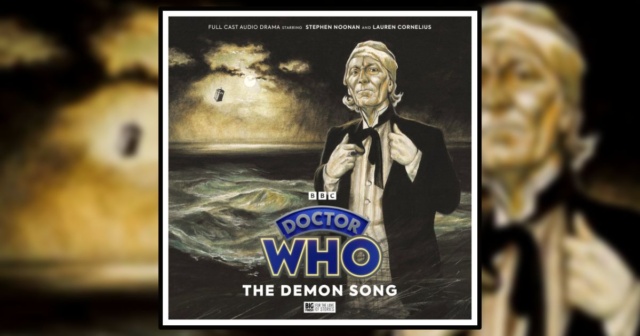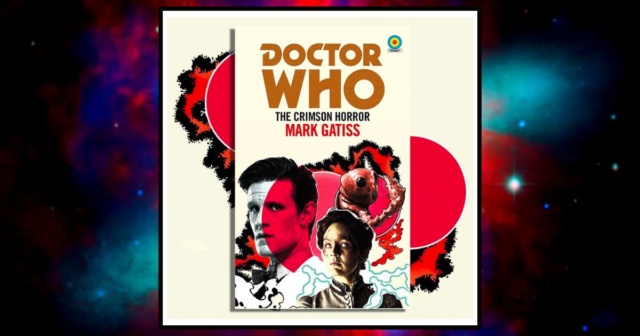The Scariest ‘Doctor Who’ Episodes to Watch This Halloween

While Doctor Who is mainly known for being a fun, zany, family show, people often overlook how genuinely scary it can be. Family-friendly horror is a delicate balance to maintain, but the British sci-fi classic has been doing it flawlessly since the beginning. Who has been terrifying children and parents alike for six decades now. Indeed, several British horror authors have cited the series as being one of their first exposures to the genre. With Halloween a few weeks away and the 60th Anniversary special around the corner, it’s the perfect time to highlight some of these TARDIS tales of terror. And so, in no particular order, here are twenty of the scariest Doctor Who episodes!
“The Empty Child” / “The Doctor Dances” written by Steven Moffat (series 1, episodes 9-10)
Starting off strong, we have the first truly terrifying entry in NuWho. While episodes like “The Unquiet Dead” and “Dalek” helped reintroduce horror to the revived series, it was this story that wormed its way into 2005 audiences’ nightmares like no other.
Sometimes referred to as “The Gas Mask Zombie Episode,” “The Empty Child” / “The Doctor Dances” features a terrifying army of infected Londoners during the London Blitz. The mysterious infection spreads with a single touch. It causes those afflicted to grow a gas mask out of their face, act strangely childish, and seek out others to spread the disease to. The scene in the hospital where a gas mask protrudes from Dr. Constantine’s throat has to be some of the yuckiest body horror in all of Who.
And of course, the infamous phrase “Are you my mummy?” will live in whovians’ nightmares forever.
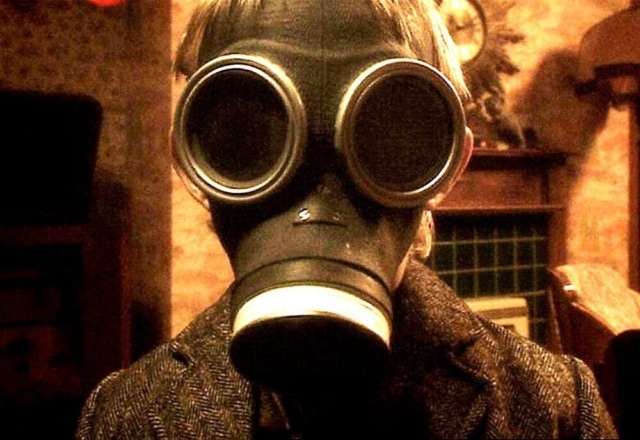
“Listen” written by Steven Moffat (series 8, episode 4)
By far the highlight of the mixed bag that was series 8, “Listen” is one of those Who horror stories that raises more questions than it answers. The concept of the episode is simple: what if there was a creature so good at camouflage, that you’d never even know it was there? The Twelfth Doctor (Peter Capaldi) becomes obsessed with finding and studying such a creature.
The episode resolves by suggesting that Twelve was merely imagining the creature all along. This episode taps into the Doctor’s psyche and fears like few others before. But something was definitely on the bed in the orphanage scene, terrifying a young Danny Pink. So what was it? While some fans have suggested it was simply another orphanage kid playing tricks, we’ll likely never know for sure.
“The Ark in Space” written by Robert Holmes & John Lucarotti (season 12, episodes 5-8)
You didn’t think we’d forget the classic series, did you? “The Ark in Space” is an absolute treat for fans of 70’s B-horror. Although some of the special effects haven’t aged the best (notably, the Wirrn larvae resembling a person wriggling around in a sleeping bag), that’s kind of part of the charm. Despite some campiness, this episode is genuinely creepy, featuring some excellent body horror of Noah slowly transforming into a Wirrn. There’s just something about huge, slimy insect monsters that will always be scary.
“Human Nature” / “The Family of Blood” written by Paul Cornell (series 3, episodes 8-9)
Easily one of the most emotional episodes of David Tennant’s Tenth Doctor era, it’s also one of the scariest. The Family of Blood makes for haunting unseen alien threats that only appear when they’ve taken over human bodies. Harry Lloyd’s performance as the possessed Son of Mine is particularly unnerving.
And if alien mind control wasn’t creepy enough, the Family also uses an army of eerie scarecrows to do their bidding. What is it about scarecrows that’s so darn spooky?
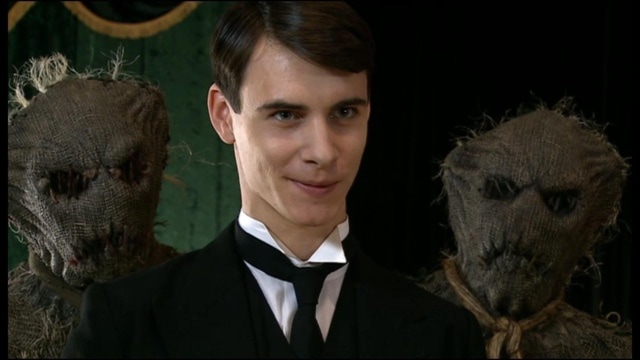
“Night Terrors” by Mark Gatiss (series 6, episode 9)
Like scarecrows, haunted dolls are a tried and true horror trope guaranteed to terrify. Maybe it’s the uncanny valley effect, maybe something else, but pretty much any version of living dolls is guaranteed to give kids and parents alike nightmares.
That’s exactly the concept of the Eleventh Doctor (Matt Smith) episode “Night Terrors.” Set in the “scariest place in the universe”, a child’s bedroom, this episode perfectly captures the childhood fear of the night. Haunted by the terrifying peg dolls, George must face his fear with the help of Eleven, Amy, and Rory. While frightening, “Night Terrors” ends up being a heartwarming story about confronting and overcoming childhood fear.
“Blink” written by Steven Moffat (series 3, episode 10)
No “scary Doctor Who episodes” list would be complete without this sci-fi horror classic. The Weeping Angels are one of the most iconic NuWho monsters, well-known even outside the Doctor Who fandom. And it’s no wonder. The concept of monsters that can only move when you look away is brilliant and dread-inducing in that uniquely Steven Moffat-y way. It doesn’t help that this episode makes you terrified of pretty much any statue, not just angel-shaped ones.
And of course, Ten’s monologue beginning with, “Don’t blink. Don’t even blink. Blink and you’re dead,” is guaranteed to chill anyone to the bone. Moffat, how dare you make me afraid of blinking?
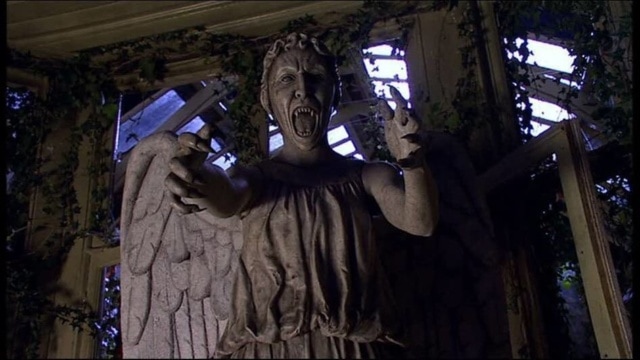
“Resolution” written by Chris Chibnall (New Year’s Special 2019)
By far one of the scariest episodes in Jodie Whittaker’s Thirteenth Doctor era, this story succeeded in making the Daleks frightening again.
We rarely see the Doctor’s most hated foes outside of their iconic pepperpot armor. However, “Resolution” centers around the squidlike Dalek creatures in their full repulsive glory. Instead of blasting away with an X-ray gun, the solitary Dalek in this episode exits its armor and hides on the backs of ordinary people. It uses its slimy tentacles to worm its way into people’s brains and control them. Tentacles + mind control = a gross and horrific experience. (Or a fun Friday night, depending on who you ask.)
“The Curse of Fenric” written by Ian Briggs (season 26, episodes 8-11)
It’s one of the great tragedies of Doctor Who that the classic series was cut short after the spectacular seasons 25 and 26. One of the highlights of this era is the exceptional “The Curse of Fenric.”
Fenric makes for an excellent cosmic horror villain. Fenric is an ancient, evil entity who made his way into Viking mythology. In this episode, he seeks to take revenge on the Doctor for trapping him in a flask centuries earlier.
Rounding out the horror in this adventure are the grotesque Haemovores. These minions of Fenric are somewhere between a vampire and a zombie. This episode also features some excellent horror filmmaking, featuring some spooky underwater photography, and creepy POV angles from the lumbering Haemovores.
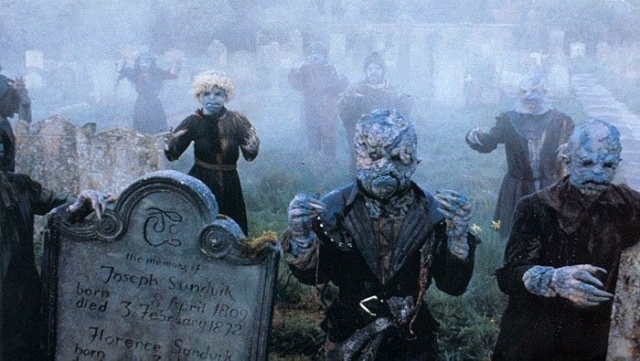
“Hide” written by Neil Cross (series 7, episode 9)
Perfect for the spooky season, this episode does the concept of a haunted house justice in true Doctor Who fashion. Featuring strange knocking noises, a ghost with a terrifying face, and a strange, twisted treelike creature, “Hide” is chock-full of spooky vibes and fun scares.
The episode takes the scares a step further by adding a layer of cosmic, existential dread. It features a sobering scene of Eleven and Clara going to the far-future Earth just before the planet is swallowed up by the sun. After which, Clara tells Eleven “We’re all ghosts to you.” Well, isn’t that a comforting thought?
“The Impossible Planet” / “The Satan Pit” written by Matt Jones (series 2, episodes 8-9)
Anything involving demons in horror is usually pretty scary. But the demons in space, on a planet orbiting a black hole, with creepy ancient runes and red-eyed aliens are enough to freak out anyone.
This story combines sci-fi horror with the supernatural in a unique way, even for Doctor Who. While, of course, the evil entity in this story isn’t the Christian Devil per se, David Tennant’s Tenth Doctor implies that the Beast is the source of demon myths across the entire universe. His evil psychic energy is just that powerful.
Beyond the fear of encountering Satan himself, this episode features the memorably desolate and apocalyptic setting of Krop Tor. Moreover, those scenes of the demon-possessed Ood pursuing Rose through ventilation tunnels are heart-racing, panic-inducing stuff.
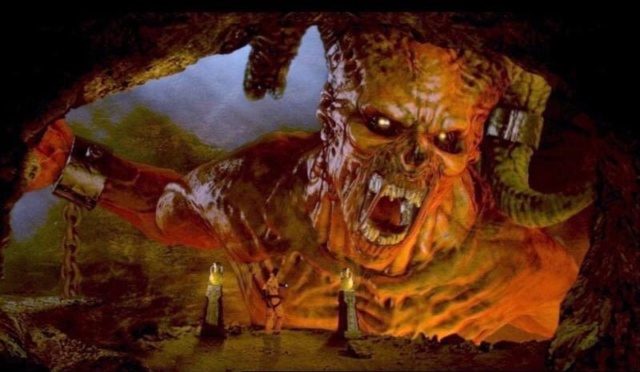
“The Green Death” written by Terry Nation (season 10, episodes 21-26)
There are few things in this world grosser than maggots. So it’s appropriate that one of the creepiest episodes of the classic series features giant, hissing maggots. As classic series special effects go, the giant maggots hold up decently well (but the giant flies they turn into are another story.) “The Green Death” also features other classic B-horror tropes such as toxic green goop and a power-mad AI. Memorably gross and thrilling.
“The Waters of Mars” written by Russell T. Davies & Phil Ford (Autumn Special 2009)
Another episode that’s both emotional and terrifying, “The Waters of Mars” features another sci-fi interpretation of zombie-like creatures. But this episode’s zombies are exceptionally creepy. There’s something about those cracked faces and unblinking white eyes.
Moreover, the method of infection is unique, as these zombies constantly ooze infectious water that spreads the disease rapidly. Add that to the claustrophobic setting of an enclosed Mars base and you’ve got one hell of a creepy Doctor Who episode.
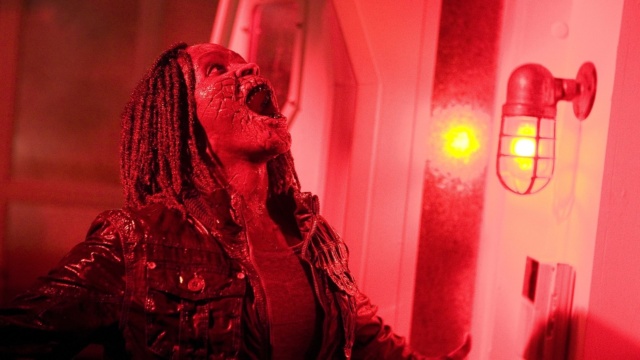
“The Time of Angels” / “Flesh and Stone” written by Steven Moffat (series 5, episodes 4-5)
Although controversial in the fandom as it shows the Weeping Angels moving, there can be no denying that “The Time of the Angels” / “Flesh and Stone” is pure nightmare fuel. There are so many memorably chilling scenes in this one, it would be hard to name them all.
Notably, the scene of Amy in the trailer with the digital Weeping Angel is one of the most anxiety-inducing scenes in all of Who. But the reveal that every single statue in the Aplan Mortaria is an Angel is jaw-dropping and bone-chilling. And, if an army of Weeping Angels wasn’t bad enough, Eleven, Amy, and River have to contend with the cosmic threat of the ominous Crack in Time swallowing up the ship.
“The Impossible Astronaut” / “Day of the Moon” written by Steven Moffat (series 6, episodes 1-2)
The opening episode of series 6 started with a literal bang, opening with the Eleventh Doctor getting shot and dying. Things only get wilder (and scarier) from there, as the TARDIS team discovers that the entire Earth is covered with faceless aliens known only as the Silence.
These aliens erase themselves from your memory as soon as you look away from them, meaning you could have seen any number in your lifetime and you’d never remember it. It’s a deeply unnerving concept, and, like so many other Steven Moffat horror concepts, it continues to plague Whovians to this day.
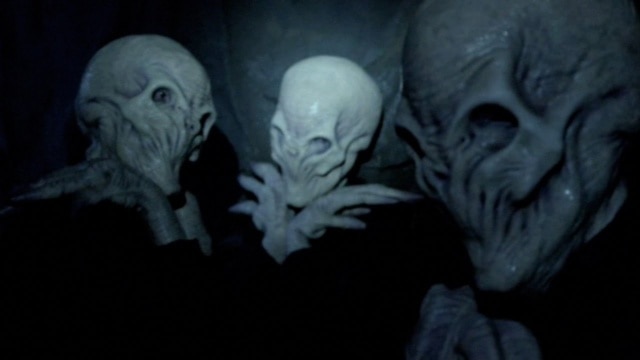
“The Edge of Destruction” written by David Whitaker (season 1, episodes 12-13)
Less scary than unnerving and off-putting, this story still perplexes fans after years. The first story to be set entirely inside the TARDIS, “The Edge of Destruction” features the first TARDIS team losing their minds and attempting to harm each other. It’s confusing, bizarre, and strangely upsetting. It’s no wonder these first few episodes of Who made such an impression on audiences back in the 60s.
“Silence in the Library” / “Forest of the Dead” written by Steven Moffat (series 4, episodes 8-9)
This story features another Steven Moffat concept that renders you terrified of ordinary, everyday things. “Silence in the Library” / “Forest of the Dead” features the first, and so far only, appearance of the Vashta Nerada: living carnivorous shadows.
According to Ten, the Vashta Nerada are the reason that all creatures across the universe are afraid of the dark. These terrifying aliens can strip a person of their flesh in seconds and slowly pick off a crew of archaeologists that accompany Ten and Donna Noble. Additionally, the location of the Library is wonderfully and unforgettably spooky. This story makes for excellent Halloween viewing.
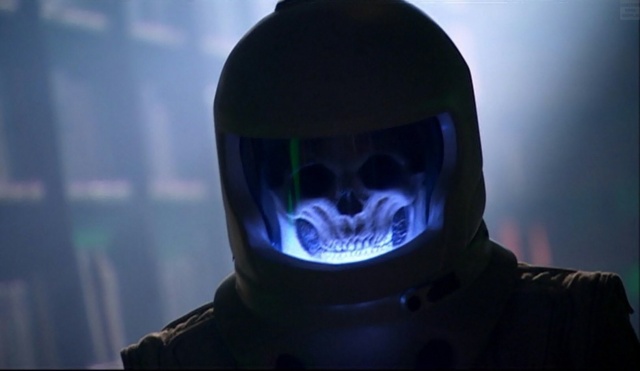
“The Lodger” written by Gareth Roberts (series 5, episode 11)
This underrated episode focuses on James Corden’s Craig, who is looking for a flatmate. The Eleventh Doctor quickly moves in after being separated from the TARDIS. But Craig has a creepy upstairs neighbor, who mimics human voices to lure passersby into the apartment, never to be seen again.
Although the concept of this episode is a little less scary than some others on this list, the real highlight of “The Lodger” is the soundtrack. The eerie score is positively hair-raising, and could easily fit into a mainstream horror film.
“Horror of Fang Rock” written by Terrance Dicks (season 15, episodes 1-4)
Emblematic of the gothic-horror-inspired Fourth Doctor (Tom Baker) era, “Horror of Fang Rock” makes excellent use of its claustrophobic, isolated setting. Set entirely in a lighthouse, it features the nemeses of the Sontarans, the Rutan Host. These aliens are creepy green amoeba-like creatures that wreak havoc on Fang Rock.
This haunting story is reminiscent of classic horror films such as “The Thing from Another World.”
“The God Complex” written by Toby Whithouse (series 6, episode 11)
This episode focuses on the concept of fear itself, so of course it was going to end up on this list. Eleven, Amy, and Rory land in what appears to be a hotel, but it has no windows or doors to the outside. A number of other humans are trapped inside as well, and they quickly discover that each room in the hotel conceals something that each person in the group fears the most.
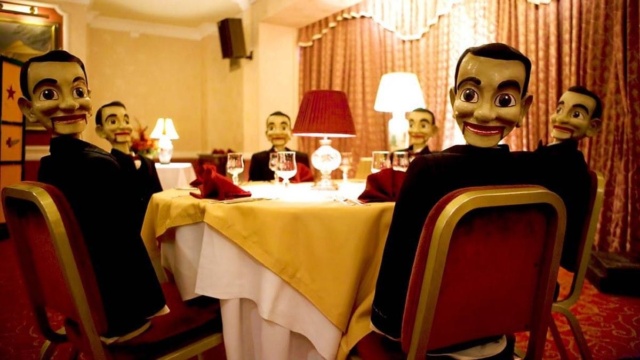
This allows for the appearance of plenty of horror tropes. From clowns to Weeping Angels, “The God Complex” is a memorably spooky episode that’s sure to send shivers down your spine.
“Midnight” by Russell T. Davies (series 4, episode 10)
Last but certainly not least is possibly the most perplexing, unresolved Doctor Who episode ever. On a planet of pure diamonds with a radioactive surface, the Tenth Doctor takes a bus tour of the Sapphire Waterfall. But when the bus breaks down, a mysterious creature begins knocking on the outside.
The passengers are terrified as the unseen force enters the shuttle and possesses someone on board. The episode is full of suspicion, paranoia, and terror as the force begins to exert its influence over everyone on board. Despite this, we never actually see the unknown creature in the entire episode. “Midnight” is a haunting reminder that sometimes, the scariest monsters are the ones we cannot see.
Are these scary Doctor Who episodes on your list?
Doctor Who will return in November for the 60th Anniversary specials. In the meantime, what do you think of my list? What are your favorite Doctor Who episodes to watch during Spooky Season? Let us know on Discord or on social media! HAPPY HALLOWEEN!
In the meantime, check out more of our Doctor Who coverage, including ranking more episodes, and review of Big Finish audio dramas, via the links below or on the Doctor Who tag archive!
Review: Big Finish’s Doctor Who: The First Doctor Adventures: The Demon Song

